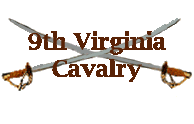
What Makes A Good Cavalry Horse?
Of course, this article is only my opinion. Any horse can make a good cavalry horse for the reenacting field if he is trained well and does not try the patience of the rest of the troop. This article is written from the perspective of a new cavalryman and his search for a good horse. If you are going to go out and look for a reenacting horse this is what I would tell you to search for.
SEX: Geldings are preferred. Mares are ok if you want to deal with mood swings and temperament problems with some. Others are fine, my best reenacting horse was a thoroughbred mare, who is now deceased, so the individual horse is the key here. Stallions are not allowed. Overall, geldings are the best bet.
AGE: Don't bother looking at any horse under the age of 5, they are too young to be experienced and have not yet grown up physically or mentally. Do not overlook horses in their late teens or early twenties if they are sound and well-trained. The ideal horse would be from 8 years of age to 14 years of age.
CONFORMATION: Look for good feet, not shelly, flat-soled or thin-walled. Most good utility conformation will fit the bill. We have horses from 14.2 to 16.2. I recommend a 15 to 15.2 hand horse with some withers but not overly prominent ones. Mutton withered horses usually show a lot of fat under the skin and the saddle will not conform to the back. Get rid of that underlayer of fat and the horse will be better able to use a McClellan saddle. High-withered horses might put the gullet of the saddle right on the withers so be careful! Extra saddle blankets don't take care of this problem and also put the rider at risk for a wreck.
DISPOSITION: The bottom line is - "Attitude is Everything". Its not fun to fight your horse so look for a horse who will allow you to make decisions without giving you grief. It's also a lot more fun to reenact with your horse if you don't have to constantly argue with him over everything. Training consistently will put a good attitude on a horse who pushes the envelope but if you don't have time to train, get a horse who is forgiving of your mistakes and willing to let you be in charge. Also remember - every time someone rides your horse they are training it. Bad riders can create problem horses, so keep this in mind when lending him to friends.
Personality faults also need to be considered when looking at a cavalry prospect. Does he pull back when tied? Does he bite or kick? Does he crib or weave? Does he act well when in the pasture with other horses where you have no control over him? Is he hard to shoe, worm or vaccinate?
BREEDS: All horses are good horses if they are well-trained. Some horses have been bred for jobs that are not suited to maneuvering in line and column with other breeds. Gaited horses come to mind here. If your horse has more gaits than the regular standard gaits of walk, trot, canter, gallop then expect to NOT practice them while in formation. Some breeds are not authentic to the reenacting we do, Paints, Appaloosas or color breeds that have obvious color characteristics are not.
COST: A good horse can be had for $500 bucks! Yes, that's true - but don't expect to get one! Those are deals you just hear about. Don't let that $2000 horse slide by because you are looking for that $500 horse. More reenactors are paying the price after they buy the horse than in their first consideration. A good horse is worth a lot of money! The cost of the horse is miniscule compared to the rest of the picture so prepare to pay some money on the horse you will be trusting with your life. If a good deal comes along, then fine, but you usually get what you pay for.
Article written by Linneus Ahearn